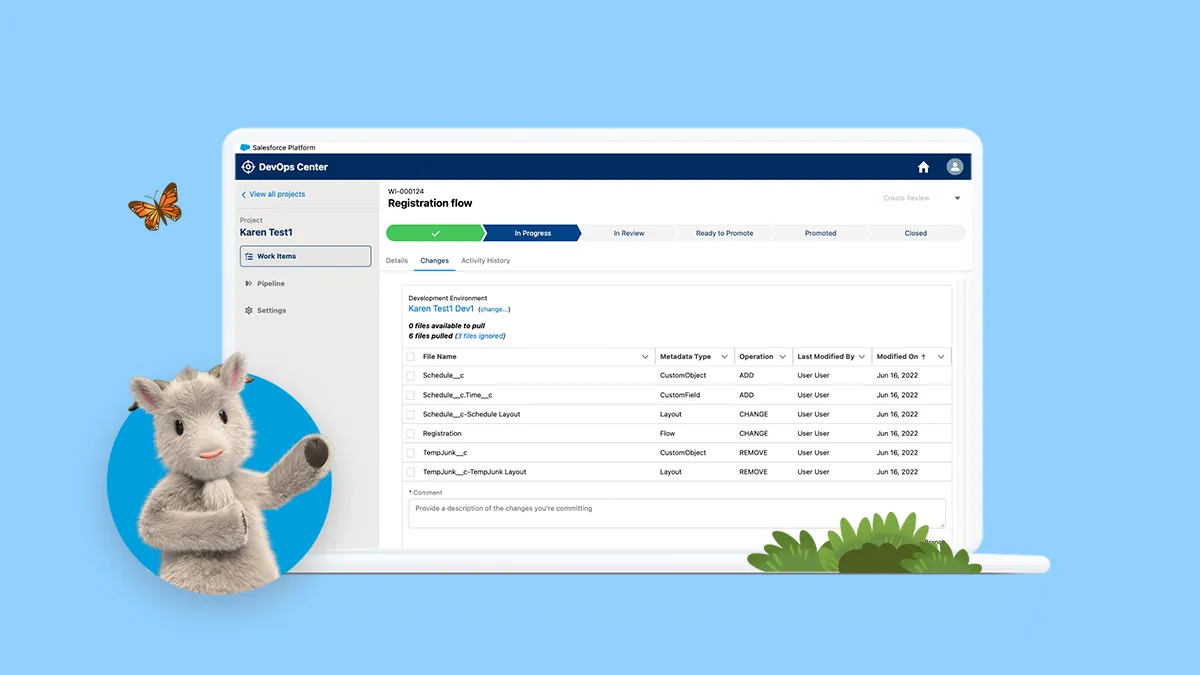Salesforce DevOps Center: A Comprehensive Guide

Introduction
Salesforce has established itself as a leading Customer Relationship Management (CRM) platform, offering a plethora of tools and functionalities to streamline business processes. As organizations scale their use of Salesforce, the need for robust development and deployment practices becomes paramount. Enter Salesforce DevOps Center, a comprehensive solution designed to enhance development, collaboration, and deployment within the Salesforce ecosystem.
What is Salesforce DevOps Center?
Salesforce DevOps Center is a set of tools and practices aimed at automating and streamlining the development and deployment of Salesforce applications. It encompasses a range of functionalities, including version control, continuous integration, continuous delivery (CI/CD), and automated testing. The goal is to facilitate a seamless development process, reduce manual intervention, and ensure high-quality code is delivered to production.

Key Features of Salesforce DevOps Center
1. Version Control Integration
Salesforce DevOps Center integrates with popular version control systems like GitHub, Bitbucket, and GitLab. This integration allows developers to manage code versions, track changes, and collaborate effectively. Version control is crucial for maintaining a single source of truth and enabling rollback capabilities in case of issues.
2. Automated CI/CD Pipelines
Continuous Integration and Continuous Delivery (CI/CD) are the cornerstones of modern software development. Salesforce DevOps Center provides automated pipelines that handle code builds, testing, and deployment. This automation reduces the risk of human error, accelerates release cycles, and ensures that code changes are thoroughly tested before reaching production.
3. Environment Management
Managing multiple Salesforce environments (development, testing, staging, production) can be challenging. DevOps Center offers tools to streamline environment provisioning, configuration, and management. It ensures that changes are propagated seamlessly across environments, maintaining consistency and reducing deployment-related issues.
4. Change Tracking and Deployment
Salesforce DevOps Center tracks changes made to the Salesforce org and provides a clear view of what has been modified, added, or deleted. This change tracking is essential for understanding the impact of deployments and ensuring that all necessary components are included in the release.
5. Automated Testing
Automated testing is a critical component of any DevOps strategy. DevOps Center integrates with testing frameworks to automate unit tests, integration tests, and end-to-end tests. This ensures that new code does not break existing functionality and meets quality standards.
6. Collaboration Tools
Effective collaboration among development teams is essential for successful DevOps practices. DevOps Center offers collaboration tools that facilitate communication, code reviews, and issue tracking. It integrates with platforms like Slack and Microsoft Teams to keep everyone on the same page.
7. Compliance and Security
Security and compliance are top priorities for any organization. DevOps Center provides tools to enforce security best practices, such as code scanning and vulnerability assessments. It also ensures that deployments comply with regulatory requirements, reducing the risk of compliance breaches.
Benefits of Using Salesforce DevOps Center
1. Improved Development Speed
Automated pipelines and streamlined processes reduce the time required to develop, test, and deploy Salesforce applications. This accelerated development speed enables organizations to respond faster to market changes and deliver new features to users more quickly.
2. Enhanced Code Quality
Automated testing and continuous integration ensure that code changes are thoroughly vetted before deployment. This results in higher code quality, fewer bugs in production, and a more stable Salesforce environment.
3. Better Collaboration
DevOps Center's collaboration tools facilitate effective communication and coordination among development teams. This improved collaboration leads to more efficient workflows, faster issue resolution, and a more cohesive development effort.
4. Reduced Deployment Risks
By automating deployments and providing clear visibility into changes, DevOps Center minimizes the risks associated with manual deployments. It ensures that deployments are consistent, repeatable, and less prone to errors.
5. Scalability
As organizations grow, their Salesforce environments become more complex. DevOps Center's tools and practices are designed to scale with the organization, accommodating increasing development demands and larger teams.
Best Practices for Implementing Salesforce DevOps Center
1. Adopt a Version Control Strategy
Implement a robust version control strategy using tools like Git. Ensure that all code changes are tracked, and branches are used for feature development, bug fixes, and releases. Conduct regular code reviews to maintain code quality.
2. Automate Everything
Automate as many processes as possible, including builds, tests, and deployments. Use CI/CD pipelines to ensure that code is continuously integrated, tested, and delivered. Automation reduces manual intervention and increases efficiency.
3. Implement Continuous Testing
Integrate automated testing into your CI/CD pipelines. Use unit tests, integration tests, and end-to-end tests to validate code changes. Ensure that tests are run with every code change to catch issues early in the development process.
4. Ensure Environment Consistency
Maintain consistency across different Salesforce environments. Use environment management tools to automate environment provisioning and configuration. Ensure that changes are propagated seamlessly from development to production.
5. Foster a Collaborative Culture
Encourage collaboration among development teams. Use collaboration tools to facilitate communication, code reviews, and issue tracking. Foster a culture of shared responsibility and continuous improvement.
6. Focus on Security and Compliance
Implement security best practices and ensure that deployments comply with regulatory requirements. Use code scanning and vulnerability assessment tools to identify and address security issues. Maintain a secure and compliant Salesforce environment.
Conclusion
Salesforce DevOps Center is a powerful solution for organizations looking to streamline their Salesforce development and deployment processes. By integrating version control, automating CI/CD pipelines, managing environments, tracking changes, and enhancing collaboration, DevOps Center helps organizations deliver high-quality Salesforce applications more efficiently and with reduced risk. Implementing best practices and leveraging the full capabilities of DevOps Center can significantly improve development speed, code quality, and overall business agility. As the Salesforce ecosystem continues to evolve, adopting a robust DevOps strategy will be essential for staying competitive and meeting the demands of modern business environments.


